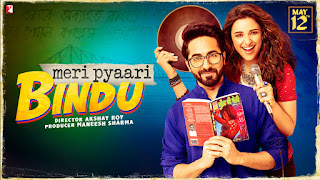Asha Jaoar Majhe : A Labour of Love (for Cinema)
First things first, Asha Jaoar Majhe: Labour of
love is not necessarily a "Bengali language film". Sure, it is
written, directed and edited by Aditya Vikram Sengupta who is a Bengali, it is
set in Kolkata, the actors are Bengali, but since this is a film without
dialogues, you can watch it without subtitles. The only Bengali you’ll hear is
in the background which is meant to inform you that the film is set in the time
of recession, labourers are losing their jobs & there is a rising
discontent between them. So if you have heard of the film, (which you may have
because of the accolades the film has earned, or because you were pestered by
me to watch it) but are not watching it because of unfamiliarity with the
language, go ahead & watch it now instead of reading this article. But if
you need more convincing, read on.
Asha Jaoar Majhe: A labour of love takes you
through a day in the lives of a working class couple who -wait for it- work different
shifts. When I dived in the web to do a little research I found out that it's
based on Italian writer Italo Calvino's short story The Adventures of a Married
couple. This story is supposed to be a part of the author's collection titled
'Difficult Loves'. But somehow I cannot find a story by that name in that
collection. If anybody knows where I can read the story, please share the
information. Another film was made around the same time based on this story by
Iranian filmmaker Keywan Karimi which is made in a short film format that runs
for 11 minutes. There have been allegations of plagiarism against Sengupta
which you can read about in this article. But I feel, despite sharing the
source material, basic premise and lack of dialogues as the primary
characteristic, the two films in their hearts are very different because of the
relationship the two lead couples share in them. While 'Adventures of a Married
Couple' (the short film) portrays the
distance between the couple that has become almost as tangible as a hard brick wall between them, Asha Jaoar
Majhe has the couple finding connection
despite the distance.
It is very natural to expect Labour of Love to be
a bleak film. But the director stays clear of that tone to an extent that some people
might call the film escapist. The camera almost never takes the protagonists
with their full surroundings. We see fragments of their abode. There are shots
that focus on their hands performing different chores and on objects. When the
husband goes to the fish market, the camera focuses on the hands of the woman
cutting the fish. This refusal to show the surrounding of the protagonists
fully can have several explanations. First, the director may want us to connect
to the characters beyond their surroundings. Second, the characters themselves
are trying to build a better life than that of their surroundings. Third, one
half of the couple feel incomplete without the other. It may also be the
combination of all of them or could mean something entirely different. Of
course, it can simply be the director stylizing the shots which is
understandable because majority of the film being shot in a contained space, a
constant medium shot ( I looked up different shots and I hope I'm using it
correctly) which would take in most of the small room would've created
monotony.
There are other instances where the director
avoids repetition. We see the woman taking the tram & a bus to reach her
workplace in the early hours of the day. But when she returns home we don't see
her riding the bus or the tram. We just see birds in the evening sky & several shots of overhead wires for
the trams in the evening sky. It also helps the director maintain the overall
serene feel as local transport in the evening is sure to be a different
ballgame in a crowded city like Kolkata. But all of it work because ultimately
the film is not about the struggle of the couple against all their hardships
but instead how they've made peace with their circumstances and are leading as
good a life as they could possibly lead.
We see in romantic films the lead couple
completing each other’s sentences, in musicals they complete each other’s lines
in a song. The popular culture taught us that it's one of the surest ways to find
your soul mate. But what if you don't meet your partner throughout the day
because you work in different shifts? What if having two mobile phones in a
family is a luxury and you can't afford the charge of a call? This film has the
answer: you complete each other's chores.
Throughout the film we see the man & the woman work in perfect sync with
each other. The woman picks up from where the man has left off & vice-versa.
The half-finished chores are their sentences half completed, their lines half
sung. When they take it up from where the other has left off, they complete
those sentences, sing the other half of the line, but all in silence. 'Tumi Je
Amar' - a classic romantic song picturized on the legendary Uttam-Suchitra
pairing - starts playing in the
background as the man leaves for work, keeping the keys in their designated place till the time the
woman takes the keys after getting back
from work and enters the room. The first few lines of the song roughly
translates as "You are mine, oh my dear. Whisper, just once in my ears,
that you are mine." When the wife picks up the keys, she finds on it the
touch of the man, still fresh, she finds the incense burning at the altar, the
freshly bought fish in the freezer, the dried up clothes: they all bear his
whispers of love to her. And she leaves her own whispering for him to listen
to when she again goes to work the next morning.
I really want to talk about the climax but I also
don't want to ruin it for you. The film that brings out the beauty in mundane
routines of everyday lives, that too of a working class couple's lives, how do you
expect it to portray those few moments between the comings & goings, the
moments that really keep the couple going through their hard days? That's something
for you to ponder before you finally watch the film.








Comments
Post a Comment